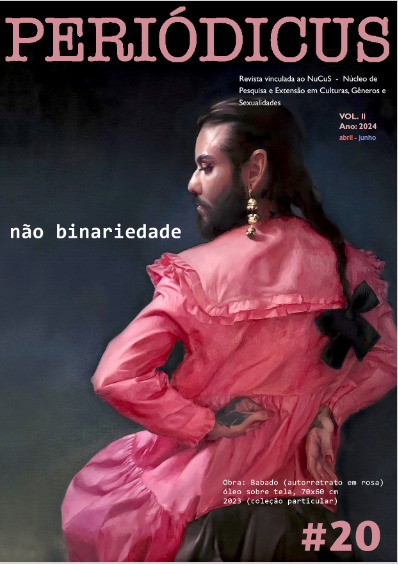Transmasculinities in Focus
Post-Pornographic Analyses on working with Digital Pornography
DOI:
https://doi.org/10.9771/peri.v2i19.47242Abstract
This article seeks to analyze academic productions about Brazilian trans men who worked with online pornography. A search was carried out using the Google Scholar platform, within a time frame of 10 years (2013-2023), finding three Brazilian articles on this specific approach and out of these, only one discussed trans men who worked in the activity. The almost absence of academic articles on that subject leads to four lines of discussion: The phenomenon of the difference in the passability of trans/transvestite men and women; the use, by trans men, of a kind of functional invisibility; the difficulty of a unified political articulation of trans men and the fact that most studies on pornography are proposed by feminist studies. For these reasons and because it is a complex issue, whose discussions cannot be easily exhausted, it is necessary to encourage the production of careful studies on trans men and pornography.
Downloads
Downloads
Published
How to Cite
Issue
Section
License
Copyright (c) 2023 Arthur Fernandes Sampaio, Maria Cristina Rocha Barreto, Céu Silva Cavalcanti

This work is licensed under a Creative Commons Attribution-NonCommercial 4.0 International License.
Autores que publicam nesta revista concordam com os seguintes termos:
Autores mantêm os direitos autorais e concedem à revista o direito de primeira publicação, com o trabalho simultaneamente licenciado sob Licença Creative Commons Attribution Noncommercial que permite o compartilhamento do trabalho com reconhecimento da autoria e publicação inicial nesta revista, sendo vedado o uso com fins comerciais.
Autores têm autorização para assumir contratos adicionais separadamente, para distribuição não-exclusiva da versão do trabalho publicada nesta revista (ex.: publicar em repositório institucional ou como capítulo de livro), com reconhecimento de autoria e publicação inicial nesta revista.
Autores têm permissão e são estimulados a publicar e distribuir seu trabalho online (ex.: em repositórios institucionais ou na sua página pessoal) a qualquer ponto antes ou durante o processo editorial, já que isso pode gerar alterações produtivas, bem como aumentar o impacto e a citação do trabalho publicado (Veja O Efeito do Acesso Livre).







